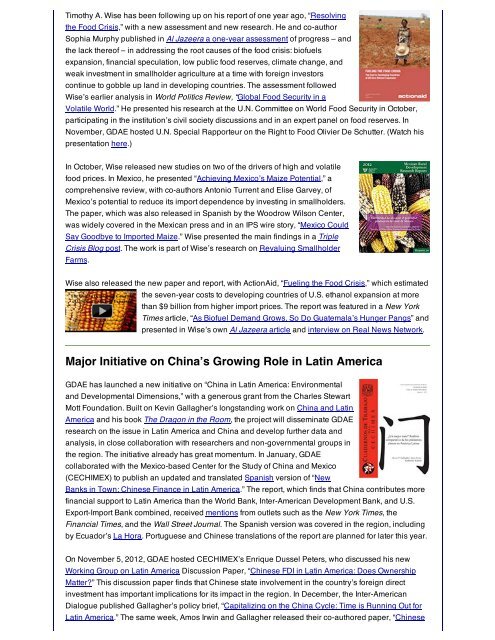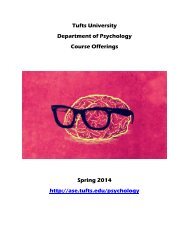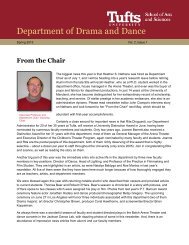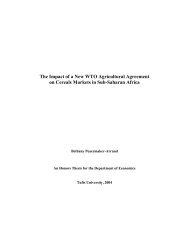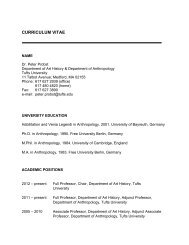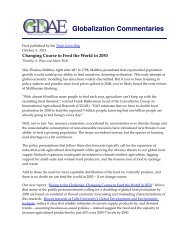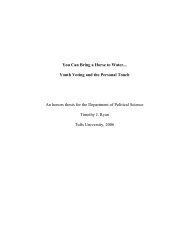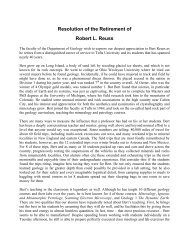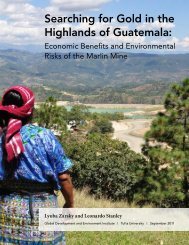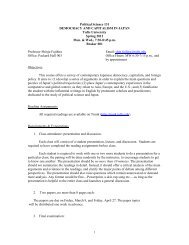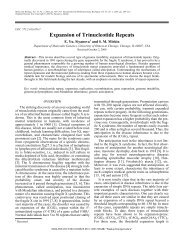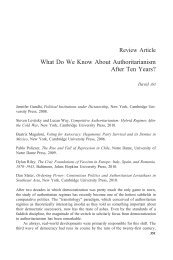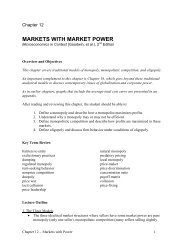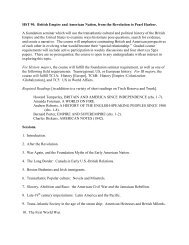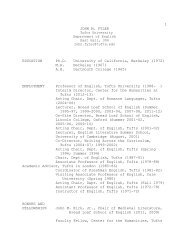GDAE Helps IMF Take “Half Step” on Capital Flows - Tufts University
GDAE Helps IMF Take “Half Step” on Capital Flows - Tufts University
GDAE Helps IMF Take “Half Step” on Capital Flows - Tufts University
You also want an ePaper? Increase the reach of your titles
YUMPU automatically turns print PDFs into web optimized ePapers that Google loves.
Timothy A. Wise has been following up <strong>on</strong> his report of <strong>on</strong>e year ago, “Resolving<br />
the Food Crisis,” with a new assessment and new research. He and co-author<br />
Sophia Murphy published in Al Jazeera a <strong>on</strong>e-year assessment of progress – and<br />
the lack thereof – in addressing the root causes of the food crisis: biofuels<br />
expansi<strong>on</strong>, financial speculati<strong>on</strong>, low public food reserves, climate change, and<br />
weak investment in smallholder agriculture at a time with foreign investors<br />
c<strong>on</strong>tinue to gobble up land in developing countries. The assessment followed<br />
Wise’s earlier analysis in World Politics Review, “Global Food Security in a<br />
Volatile World.” He presented his research at the U.N. Committee <strong>on</strong> World Food Security in October,<br />
participating in the instituti<strong>on</strong>’s civil society discussi<strong>on</strong>s and in an expert panel <strong>on</strong> food reserves. In<br />
November, <str<strong>on</strong>g>GDAE</str<strong>on</strong>g> hosted U.N. Special Rapporteur <strong>on</strong> the Right to Food Olivier De Schutter. (Watch his<br />
presentati<strong>on</strong> here.)<br />
In October, Wise released new studies <strong>on</strong> two of the drivers of high and volatile<br />
food prices. In Mexico, he presented “Achieving Mexico’s Maize Potential,” a<br />
comprehensive review, with co-authors Ant<strong>on</strong>io Turrent and Elise Garvey, of<br />
Mexico’s potential to reduce its import dependence by investing in smallholders.<br />
The paper, which was also released in Spanish by the Woodrow Wils<strong>on</strong> Center,<br />
was widely covered in the Mexican press and in an IPS wire story, “Mexico Could<br />
Say Goodbye to Imported Maize.” Wise presented the main findings in a Triple<br />
Crisis Blog post. The work is part of Wise’s research <strong>on</strong> Revaluing Smallholder<br />
Farms.<br />
Wise also released the new paper and report, with Acti<strong>on</strong>Aid, “Fueling the Food Crisis,” which estimated<br />
the seven-year costs to developing countries of U.S. ethanol expansi<strong>on</strong> at more<br />
than $9 billi<strong>on</strong> from higher import prices. The report was featured in a New York<br />
Times article, “As Biofuel Demand Grows, So Do Guatemala’s Hunger Pangs” and<br />
presented in Wise’s own Al Jazeera article and interview <strong>on</strong> Real News Network.<br />
Major Initiative <strong>on</strong> China’s Growing Role in Latin America<br />
<str<strong>on</strong>g>GDAE</str<strong>on</strong>g> has launched a new initiative <strong>on</strong> “China in Latin America: Envir<strong>on</strong>mental<br />
and Developmental Dimensi<strong>on</strong>s,” with a generous grant from the Charles Stewart<br />
Mott Foundati<strong>on</strong>. Built <strong>on</strong> Kevin Gallagher’s l<strong>on</strong>gstanding work <strong>on</strong> China and Latin<br />
America and his book The Drag<strong>on</strong> in the Room, the project will disseminate <str<strong>on</strong>g>GDAE</str<strong>on</strong>g><br />
research <strong>on</strong> the issue in Latin America and China and develop further data and<br />
analysis, in close collaborati<strong>on</strong> with researchers and n<strong>on</strong>-governmental groups in<br />
the regi<strong>on</strong>. The initiative already has great momentum. In January, <str<strong>on</strong>g>GDAE</str<strong>on</strong>g><br />
collaborated with the Mexico-based Center for the Study of China and Mexico<br />
(CECHIMEX) to publish an updated and translated Spanish versi<strong>on</strong> of “New<br />
Banks in Town: Chinese Finance in Latin America.” The report, which finds that China c<strong>on</strong>tributes more<br />
financial support to Latin America than the World Bank, Inter-American Development Bank, and U.S.<br />
Export-Import Bank combined, received menti<strong>on</strong>s from outlets such as the New York Times, the<br />
Financial Times, and the Wall Street Journal. The Spanish versi<strong>on</strong> was covered in the regi<strong>on</strong>, including<br />
by Ecuador’s La Hora. Portuguese and Chinese translati<strong>on</strong>s of the report are planned for later this year.<br />
On November 5, 2012, <str<strong>on</strong>g>GDAE</str<strong>on</strong>g> hosted CECHIMEX’s Enrique Dussel Peters, who discussed his new<br />
Working Group <strong>on</strong> Latin America Discussi<strong>on</strong> Paper, “Chinese FDI in Latin America: Does Ownership<br />
Matter?” This discussi<strong>on</strong> paper finds that Chinese state involvement in the country’s foreign direct<br />
investment has important implicati<strong>on</strong>s for its impact in the regi<strong>on</strong>. In December, the Inter-American<br />
Dialogue published Gallagher’s policy brief, “<strong>Capital</strong>izing <strong>on</strong> the China Cycle: Time is Running Out for<br />
Latin America.” The same week, Amos Irwin and Gallagher released their co-authored paper, “Chinese


